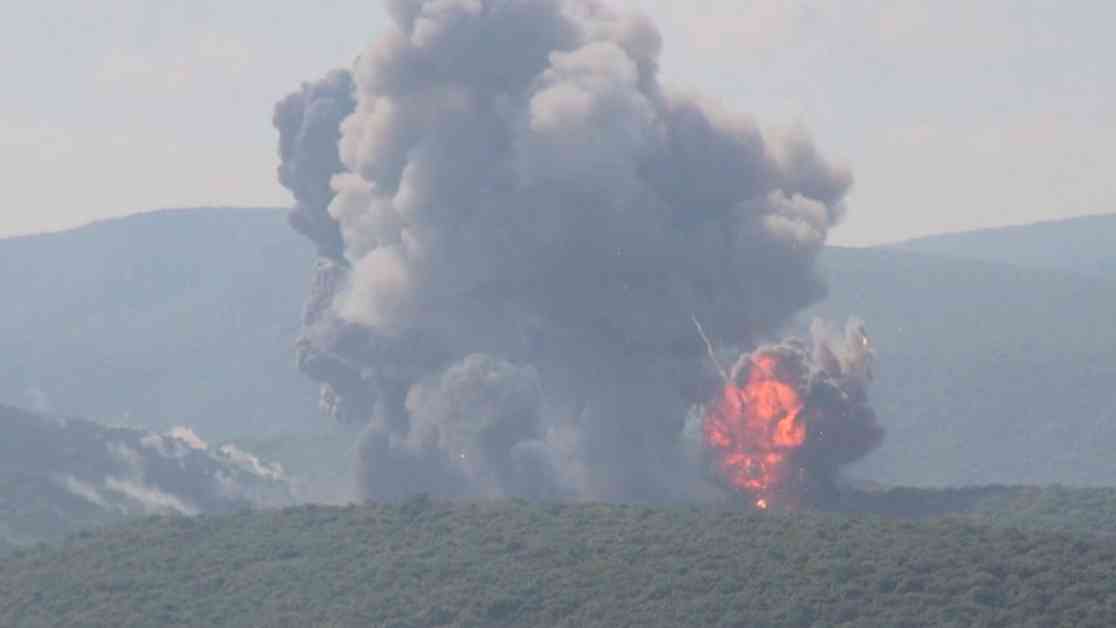Israel’s recent airstrikes in Lebanon have sparked concerns of igniting a regional war. The operation, conducted by over a hundred Israeli warplanes, was justified by Israel as a pre-emptive strike to thwart an alleged imminent attack by Hezbollah involving thousands of rocket launches. This risky military move follows Israel’s long-standing doctrine of using offense as the best defense strategy.
Historically, Israel has employed audacious air attacks, such as the obliteration of Egyptian leader Gamal Abdel Nasser’s air force in 1967 and Saddam Hussein’s atomic program in 1981. In this recent operation, Israel claims it aimed to neutralize Hezbollah, a powerful militant group based in Lebanon. However, the actual impact of the airstrikes remains unclear, with Hezbollah claiming to have successfully hit 11 targets in Israel and launching 320 Katyusha rockets in retaliation.
Tensions between Israel and Hezbollah have been escalating, with Israel bracing for revenge attacks following the assassination of Hezbollah’s chief of staff, Fuad Shukr, in Beirut, and the killing of Hamas leader Ismail Haniyeh in Tehran. Israeli intelligence sources had identified potential targets in Israel, including an airbase used in the strike on Shukr and the headquarters of Unit 8200, the Israeli military intelligence agency. Hezbollah, on the other hand, asserts that Israel’s operation failed to preempt its retaliation and claims to have struck deep within Israeli territory.
As the situation unfolds, key questions arise regarding Hezbollah’s next move and the impact on efforts to end the conflict in Gaza. Will Hezbollah escalate further, or is today’s action the culmination of its retaliation? All eyes are on Hezbollah’s leader, Hassan Nasrallah, who is set to address his followers via video link. The organization’s intentions in the coming days remain a subject of speculation.
Hezbollah’s attacks on Israel have been ongoing since October, following Hamas atrocities, leading to a daily artillery duel along the border. Israeli intelligence estimates suggest Hezbollah has amassed a significant arsenal of missiles in southern Lebanon, posing a threat to Israel’s security. The possibility of a wider war looms as each exchange of fire raises the risk of unintended civilian casualties and escalation.
Despite the recent airstrikes in Lebanon, efforts towards a ceasefire in Gaza continue, with delegations en route to Cairo for further negotiations. The urgency of diplomacy is underscored by the need to prevent further escalation in the region. However, the Israeli Prime Minister, Benjamin Netanyahu, may be hesitant to agree to ceasefire terms that could destabilize his coalition government.
US, Qatari, and Egyptian mediators advocate for a ceasefire in Gaza as a means to reduce tensions in the region and potentially pave the way for broader peace efforts. The delicate balance of power in the Middle East hangs in the balance as Israel navigates internal and external pressures to reach a resolution. The recent events highlight the complex dynamics at play and the critical need for diplomatic solutions to prevent further conflict.
Implications of Israeli Airstrikes in Lebanon
The Israeli airstrikes in Lebanon have far-reaching implications for the region, with the risk of igniting a broader conflict. The escalation of tensions between Israel and Hezbollah underscores the volatile nature of the Middle East and the potential for miscalculation leading to devastating consequences. The use of military force as a preemptive measure sets a dangerous precedent and raises concerns about the cycle of violence in the region.
Regional Security Concerns
The recent military operation by Israel raises questions about regional security and stability. The presence of a significant missile arsenal in southern Lebanon poses a direct threat to Israel’s security and highlights the need for de-escalation measures. The risk of unintended civilian casualties and the potential for a wider war underscore the urgent need for diplomatic solutions to prevent further conflict.
International Diplomacy and Conflict Resolution
The ongoing efforts towards a ceasefire in Gaza and negotiations in Cairo highlight the importance of international diplomacy in resolving conflicts in the Middle East. The role of mediators from the US, Qatar, and Egypt underscores the need for multilateral cooperation to address complex geopolitical challenges. The delicate balance of power and competing interests in the region require careful navigation to prevent further escalation and promote peace.
In conclusion, the recent airstrikes in Lebanon by Israel have raised concerns about the potential for a regional war and the need for diplomatic solutions to prevent further conflict. The complex dynamics at play in the Middle East highlight the importance of international cooperation and conflict resolution efforts to ensure stability and security in the region. As tensions continue to escalate, the urgency of finding peaceful resolutions becomes increasingly critical to prevent further violence and humanitarian crises.












